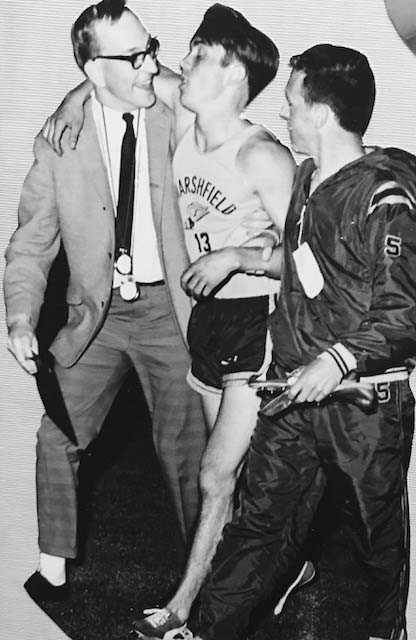
Long before he was setting or breaking every American distance record from 2,000 meters to 10,000 meters, long before the fans at Hayward Field in Eugene screamed “PRE! PRE! PRE!” at the sight of the racing heartthrob who did not lose on the track during his entire collegiate career at the University of Oregon, Steve Prefontaine was a well-liked kid growing up in a blue-collar town on the Oregon coast with no idea that he was preparing to be a legend.
Steve Prefontaine was born into a working-class family in Coos Bay, Oregon in 1951, the son of a World War II veteran father, a welder and carpenter who built the family home; and a mother, who worked as a seamstress.
Even in grade school everyone called him “Pre.” When you have a last name like “Prefontaine,” it’s only natural. His kid sister, Linda, was “Pre” also. Both were very athletic and, being just over two years apart, they did a lot of things together and shared common values growing up. Prefontaine played all kinds of organized sports in his formative years – he loved to compete at everything -- but running wasn’t on his radar.
“There were no running groups in this small town in the 60s,” Linda recalled.
During physical education class in his eighth grade year, Prefontaine noticed that he was outperforming his peers in distance running. It piqued his interest in cross country and he joined the team upon entering Marshfield High School as a 14-year-old ninth grader in 1965.
Trained by coach Walt McClure Jr., Prefontaine was a credible but undistinguished member of the cross country and track teams in his first year. He placed 53rd at the cross country state championships, which was run over a 2.5-mile course; and recorded a personal best of 5:01 in the mile.
Prefontaine was better in his sophomore year. He placed sixth at the OSAA cross country championships but failed to qualify on the track in his favorite event, the two-mile run. That setback resonated with Prefontaine.
“He decided he wanted to win so he worked his butt off,” Linda said.
Prefontaine spent the summer between his sophomore and junior seasons working at getting better. His parents were hard workers so putting in the time came naturally to him.
“He understood the value of working harder than his competition,” said Linda.
All of that hard work paid off for Prefontaine starting with his junior year. He went undefeated in cross country and won the state title in 12:13.8. He also won the state track title in the mile.
His dedication to his craft extended into the school year.
“My brother would get up early in the morning to run, back before the rest of us were up, went to school, ran after work, had a part-time job, girlfriend and did his homework for school,” Linda recalled. “What kid today can pull off that schedule and do it successfully?”
Prefontaine was even better as a senior. He repeated his state title in cross country, running 11:30.2, and won both the mile and two-mile at the OSAA track & field meet. He also set a national schoolboy record in the two-mile at the Corvallis Invitational, running in 8:41.5, almost seven seconds faster than the previous mark.
As a high school senior, Prefontaine’s reputation extended throughout the state of Oregon.
In the spring of his senior year, Prefontaine attempted to break the four-minute mile on the Marshfield High School track that now bears his name. The event was such a big deal that the baseball teams from Marshfield and Newport shortened their game to watch him run.
Prefontaine gained national attention after breaking the two-mile record. He didn’t have the kind of fame he might have today in the age of social media, computers and cell phones, but “Pre” helped put Marshfield High and Coos Bay, Oregon on the map.
Prefontaine’s reputation grew to legendary proportions at the University of Oregon, where he won three NCAA cross country titles and four NCAA track titles in the three-mile race, running from the front with his barrel chest and a spirit that stirred everyone who watched him. Fans shouted his name, “PRE!” incessantly when he competed at Hayward Field and T-shirts with the words ‘Legend” or “Go PRE” were everywhere.
Prefontaine even competed in the 1972 Olympics in Munich, where he finished just outside of medal position in the 5,000 meters after leading with less than 600 meters remaining. He set his last national record three weeks before he died, at age 24, in a single-car crash in Eugene in 1975, just one year before the 1976 Olympic Games in Montreal that might have made him an international superstar.
It all started in Coos Bay, Oregon, competing with his sister, Linda, and outworking his competition, back in the days before Pre was “PRE!”









